

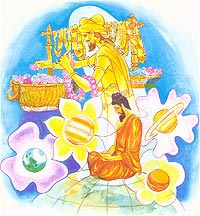 |
Verse 44. The Garland-Maker
Explanation: An expert in garland making will select, pluck and arrange flowers into garlands. In the same way who will examine the nature of life penetratingly? Who will perceive the real nature of life in the world, along with the realms of the underworld and heavenly beings? Who will understand and penetratively perceive the well-articulated doctrine, like an expert maker of garlands, deftly plucking and arranging flowers. |
 |
Verse 45. The Seeker Understands
Explanation: In the previous stanza the question was raised as to who will penetrate the well-articulated doctrine? The present stanza provides the answer: the student, the learner, the seeker, the person who is disciplined. He or she will perceive the doctrine, like the expert garland-maker who recognizes and arranges flowers. It is the learner, the seeker, the student who will perceive the world of Yama, the realm of heavenly beings and existence on earth. He will discard and determine the various areas of the doctrine, life a deft garland-maker who plucks and arranges the flowers into garlands. |
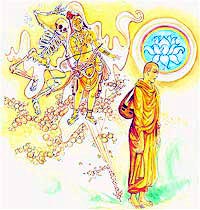 |
Verse 46. Who Conquers Death?
Explanation: This body of ours is like froth, bubbles, or foam. It disintegrates quickly. The nature of life is like a mirage, an illusion. Therefore, one must give up these unrealities. To achieve that one must destroy Mara’s flower-arrows by which he tempts men and women. It is necessary that the truth-seeker should go beyond Mara’s region, to areas unseen by him. Mara knows only the realm of death. The truth seeker goes beyond that region to the ‘deathless’ (Nibbana) - a domain Mara has never seen. |
 |
Verse 47. Pleasure Seeker Is Swept Away
Explanation: Those men and women , fascinated by worldly things, go about seeking pleasure, like a garland-maker picking the flowers of his choice in a garden. But, gradually and silently, death overcomes them like a flood in the night sweeping away a village asleep. |
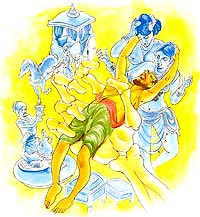 |
Verse 48. Attachment To Senses If Folly
Explanation: Those who pursue worldly pleasures are like garland-makers who pick flowers here and there in the garden according to their preference. Those given to pleasures of the senses are not satisfied. They seek still more. In consequence of their endless pleasure-seeking they come under the spell of Antaka, or ‘ender of all’, i.e. death. |
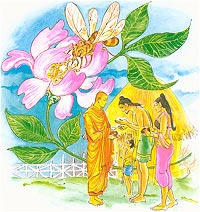 |
Verse 49. The Monk In The Village
Explanation: The bee extracts honey from flowers without damaging either the colour or the fragrance of the flower and in so doing helps the tree bear much fruit. Similarly, the silent sage goes about the village collecting alms without harming anyone even minutely, and in so doing helps people gain much merit and happiness. |
 |
Verse 50. Look Inwards And Not At Others
Explanation: Do not find fault with others. Do not worry about what others do or not do. Rather, look within yourself to find out what you yourself have done or left undone. Stop doing evil; do good. |
 |
Verse 51. Good Words Attract Only Those Who Practice
Explanation: A flower may be quite attractive, alluring. It may possess a brilliant hue. But, if it is devoid of fragrance, and has no scent, it is of no use. So is the well spoken word of him who does not practice it. It turns out to be useless. |
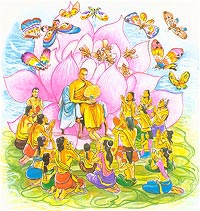 |
Verse 52. Good Words Profit Only Those Who Practise
Explanation: A flower may be quite attractive, alluring and possessing a brilliant hue. In addition, it may be also full of fragrance. So is the person who is well spoken and practises what he preaches. His words are effective and they are honoured. |
 |
Verse 53. Those Born Into This World Must Acquire Much Merit
Explanation: The deft maker of garlands takes a variety of flowers. Out of these he creates garlands of different strands and variegated arrangements. In the same way, those who are born into this world should, out of their lives, create good, wholesome, meritorious actions of a vast variety. |
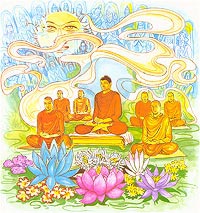 |
Verse 54. Fragrance of Virtue Spreads Everywhere
Explanation: The world knows, many a sweet smelling flower and fragrant object. But, the fragrance of these moves only leeward. None of these, however strong their fragrance may be, spread their sweet smell against the wind. But, in contrast, the sweet smell of virtue of a spiritually evolved individual spreads in all directions and is universally experienced. |
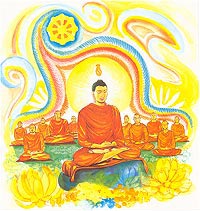 |
Verse 55. Fragrance Of Virtue Is The Sweetest Smell
Explanation: Sandalwood, lavender, water-lily and the jasmine exude fragrance. Of all these varieties of fragrances the sweet-smell of virtue is the most supreme. This is because the fragrance of virtue is universally favoured. Besides, the fragrance of virtue spreads in all directions, even against the wind. |
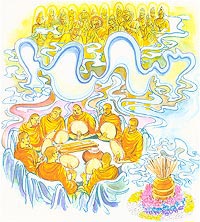 |
Verse 56. Fragrance Of Virtue Wafts To Heaven
Explanation: The fragrance of lavender and sandalwood is quite slight. Why? Because it is limited in this world. Such a fragrance can spread only on earth. This way it is a very slight fragrance. But, the sweet smell of virtue is, in contrast, supreme, because it spreads not only throughout the earth, it rises even to the highest heavens. |
 |
Verse 57. Death Cannot Trace The Path Of Arahats
Explanation: Of those noble one, who are perfect in behaviour, living constantly alert, fully aware of the experience within, Mara, the evil one, does not know their destiny. Mara can trace only the slothful dead. He cannot trace those who have reach the Deathless. |
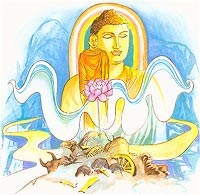 |
Verse 58. Lotus Is Attractive Though In A Garbage Heap
Explanation: Someone is likely to dump refuse on a high road. In that heap of refuse, a sweet-smelling lotus is likely to grow. |
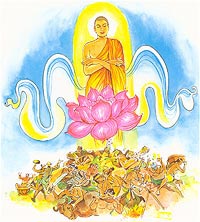 |
Verse 59. Arahats Shine Wherever They Are
Explanation: In the same way, in the heap of rubbish made up of various types of foolish people, the disciple of the Buddha shines above all others. |
| |
|
|
| |
|
|
| |
|
| |
|
|
|
|
|
|
|